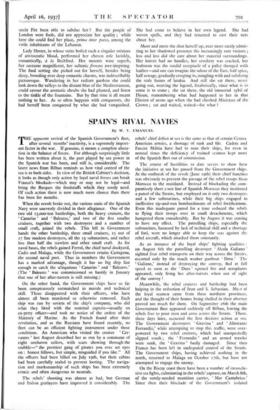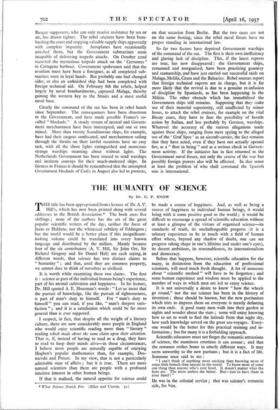SPAIN'S RIVAL NAVIES
By W. V. EMANUEL
When the revolt broke out, the various units of the Spanish Navy were unevenly divided in their allegiance. One of the two old 15,000-ton battleships, both the heavy cruisers, the Canarias ' and ' Baleares,' and two of the five smaller cruisers, together with two destroyers and a number of small craft, joined the rebels. This left in Government hands the other battleship, three small cruisers, 15 out of 57 fine modern destroyers, all the 13 submarines, and rather less than half the trawlers and other small craft. As for naval bases, the rebels gained Ferrol, the chief naval dockyard, Cadiz and Malaga, while the Government retains Cartagena, the second naval port. Thus in numbers the Government has a marked advantage, though it has no big ship fast enough to catch the ubiquitous Canarias ' and Baleares.' (The Baleares ' was commissioned so hastily in January that one of her after-turrets is still missing.) On the other hand, the Government ships have so far been conspicuously outmatched in morale and technical skill. These disappeared with their officers, who have almost all been murdered or otherwise removed. Each ship was run by soviets of the ship's company, who did what they liked with the nominal captain—usually an ex-petty officer—and took no notice of the orders of the Ministry of Marine. As the French found after their revolution, and as the Russians have found recently, no -fleet can be an efficient fighting instrument under these conditions. An American who visited the cruiser ' Cer- vantes ' last August described her as run by a commune of eight unshaven sailors, with scars showing through the stubble—" the prettiest gang of pirates you ever set eyes .on : honest fellows, but simple, misguided if you like." All the officers had been killed on July 19th, but their cabins had been carefully sealed to prevent looting. The naviga- tion and marksmanship of such ships has been extremely erratic and often dangerous to neutrals.
The rebels' shooting was almost as bad, but German and Italian gunlayers have improved it considerably. The rebels' chief defect at sea is the same as that of certain Contra American armies, a shortage of rank and file. Cadets and Fascist Militia have had to man their ships, for even in normal times the deficiency of trained seamen kept most of the Spanish fleet out of commission.
The course of hostilities to date serves to show how the initiative at sea has passed from the Government ships. At the outbreak of the revolt (June t9th) their chief function was obviously to prevent the passage of the rebel troops from Morocco to the mainland. Instead of blockading the com- paratively short cast line of Spanish Morocco they instituted a patrol of the Straits, but employed on it only two destroyers and a few submarines, while their big ships engaged in ineffective tip-and-run bombardments of rebel fortifications. Even this inadequate patrol for a time reduced the rebels to flying their troops over in small detachments, which hampered them considerably. But by August it was ceasing to have any effect. The patrolling ships, especially the submarines, harassed by lack of technical skill and a shortage of fuel, were no longer able to keep the seas against the rebel aircraft, which attacked them constantly.
As an instance of the loyal ships' fighting qualities : on August 6th the patrolling destroyer Alcala Galiano ' sighted four rebel transports on their way across the Straits, escorted only by the much weaker gunboat Dato.' The Galiano,' instead of destroying the convoy, fled at full speed as soon as the Dato ' opened fire and aeroplanes appeared, only firing her after-turrets when out of sight of the convoy !
Meanwhile, the rebel cruisers and battleship had been helping in the reduction of Irun and S. Sebastian. Mort of the loyal seamen came from these northern provinces, and the thought of their homes being shelled in their absence proved too much for them. On September z6th the main Government fleet appeared suddenly off Bilbao, leaving the rebels free to pour men and arms across the Straits. There, three days later, occurred the first decisive action at sea. The Government destroyers Gravina ' and Almirante Ferrandiz,' while attempting to stop this traffic, were over- powered by two rebel cruisers, which had unexpectedly slipped south ; the `Ferrandiz' and an armed trawler were sunk, the Gravina ' badly damaged. Since then Franco has been left in undisputed control of the Straits. The Government ships, having achieved nothing in the north, returned to Malaga on October r7th, but have not attempted to engage the enemy.
On the Biscay coast there have been a number of inconclu- sive sea fights, culminating in the rebels' capture, on March 8th, of the sorely-needed munition carrier, Mar Cantabrico.' Since then their blockade of the Government's isolated Basque supporters, who can only receive assistance by sea or air, has drawn tighter. The rebel cruisers have been bom- barding the coast and stopping valuable supply ships apparently with complete impunity. Aeroplanes have occasionally attacked them, but the Government submarines seem incapable of delivering torpedo attacks. On October 22nd occurred the mysterious torpedo attack on the Cervantes ' in Cartagena harbour. Government spokesmen said that the assailant must have been a foreigner, as all completed sub- marines were in loyal hands. But probably one had changed sides, or else an unfinished ship had been completed with foreign technical aid. On February 8th the rebels, helped largely by naval bombardments, captured Malaga, thereby gaining the western key to the Straits and a most useful naval base.
Clearly the command of the sea has been in rebel hands since September. The consequences have been disastrous to the Government, and have made possible Franco's so- called " blockade." A steady stream of neutral and Govern- ment merchantmen have been intercepted, and one or two mined. More than twenty Scandinavian ships, for example, have had their cargoes confiscated, and merchantmen sailing through the Straits on their lawful occasions have no easy task, with all the shore lights extinguished and numerous strange warships steaming about without lights. The Netherlands Government has been roused to send warships and institute convoys for their much-molested ships. In fairness to Franco it should be remembered that the attempted Government blockade of Cadiz in August also led to protests, on that occasion from Berlin. But the two cases are not On the same footing, since the rebel naval forces have no proper standing in international law.
So far two factors have deprived Government warships of the command of the sea. The first is their own inefficiency and glaring lack of discipline. This, if the latest reports are true, has now disappeared : the Government ships, remanned and reorganised, have been practising gunnery and seamanship, and have just carried out successful raids on Malaga, Melilla, Ceuta and the Balearics. Rebel sources report that foreign technical experts are in charge, but it is far more likely that the revival is due to a genuine re-infusion of discipline by Spaniards, as has been happening in the Militia. The other obstacle which has immobilised the Government ships still remains. Supposing that they make use of their material superiority, still unaffected by minor losses, to attack the rebel cruisers, for example on the vital Biscay coast, they have to face the possibility of hostile action by Italian, and less probably by German, warships. Whatever the accuracy of the various allegations made against these ships, ranging from mere spying to the alleged use of the Graf Spec ' as an aircraft-carrier, the fact remains that they have acted, even if they have not actually opened fire, as a " fleet in being " and as a serious check to Govern- ment activity. If the initiative has in fact returned to the Government naval forces, not only the course of the war but possibly foreign powers also will be affected. In that sense at least the problem of who shall command the Spanish seas is international.























































 Previous page
Previous page